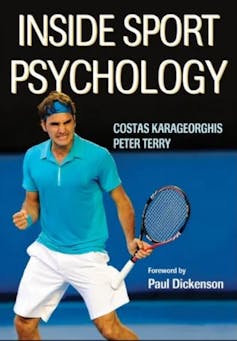Self-entitled prima donnas or do they have a point? Why Australian Open tennis players find hard lockdown so tough
- Written by Peter Terry, Professor of Psychology, University of Southern Queensland
The challenge of bringing the world’s best tennis players and support staff, about 1,200 people in all, from COVID-ravaged parts of the world to our almost pandemic-free shores was always going to be a big ask.
Soon after this star-studded Australian Open entourage arrived in Melbourne, ten cases of COVID-19 were identified (some later reclassified as being old infections). As a result, 72 players classified as close contacts were confined to hotel rooms with no access to what they thought they had been promised — a daily five-hour session on the practice courts within the quarantine bubble.
Meanwhile, the superstars of the sport (Novak Djokovic, Rafa Nadal, Serena Williams and Naomi Osaka among them) were apparently enjoying much better conditions in Adelaide.
Social media turned white hot.
Spanish world number 13 Roberto Bautista Agut described conditions as like prison “but with wifi”.
Meanwhile Kazakhstan’s Yulia Putintseva wished she had she been warned about the potential for hard lockdown and sharing her room with a mouse.
The flames were fanned by Novak Djokovic’s list of demands for improved conditions, admittedly on behalf of his fellow players and which he later said were just suggestions, which Victorian Premier Daniel Andrews immediately rejected.
Then, the backlash started
Fellow players waded in, with Nick Kyrgios labelling Djokovic “a tool” on Twitter and savaging Bernard Tomic’s partner as having “no perspective” for complaining about having to wash her own hair.
Condemnation of players who complained about being in quarantine, when the population of Melbourne had recently endured 112 days of lockdown, was swift and universal.
The consensus was that, instead of complaining, the self-entitled prima donnas should be grateful for the opportunity to play in one of the world’s great sporting events, pocketing between A$100,000 and $2.75m in prize money (for the singles) after their all-expenses paid trip down under.
When we put people on a pedestal
This looks like a clear case of pedestal syndrome backfiring, a term popularised in sport psychology by Jeffrey Bond, who worked with tennis legend Pat Cash when he won Wimbledon in 1987.
 Hotel quarantine can easily upset players’ moods but they could benefit from the isolation to work on the psychological aspects of their game.
Booktopia
Hotel quarantine can easily upset players’ moods but they could benefit from the isolation to work on the psychological aspects of their game.
Booktopia
It’s not a clinical diagnosis, but refers to the tendency to exalt those we admire to a position where we (and they) perceive they can do no wrong.
After all, when the world treats you like something special, feted and adored wherever you go, is it any wonder you start to believe the normal restrictions of a pandemic, indeed of life, do not apply to you?
Maybe the Australian Open should not have been held at all this year, as some prominent health experts have advised.
However, once the decision to proceed with the tournament next month was confirmed, wasn’t it incumbent upon the organisers to create a level playing field for competitors?
There is little doubt those in hard lockdown may be disadvantaged come tournament time.
Is lockdown treating all players equally?
With several of the world’s top players having greater freedom to train in Adelaide compared with those in Melbourne quarantine, some players are also questioning if they’ll be at an advantage when the tournament starts.
The better deal for those in Adelaide includes having a larger support team available, use of the hotel gym, and the opportunity to play exhibition matches.
As Austrian doubles specialist Philipp Oswald, in Melbourne quarantine, described it:
It’s not apples and apples here, but apples and pears — and I caught the sour lemon.
Players risk losing fitness
Research by university colleague Professor Tim Gabbett would predict the decline in fitness among those in hard lockdown will be significantly greater than among those allowed to train outdoors for up to five hours a day.
More than that, the rapid increase in training once released from lockdown will significantly increase injury risk and diminish capacity to maintain performance over the course of a five-set match. In short, advantage all those who escaped hard lockdown.
Read more: Get a grip: the twist in the wrist that can ruin tennis careers
Then there is the issue of players’ psychological state leading into the tournament. My own research has highlighted the significant mood disturbance associated with COVID-19 restrictions, which were less restrictive than the hard lockdown many players are currently enduring.
It is well established that mood states affect performance in sport, and the negative moods likely engendered by lockdown will not encourage tournament success.
There could be benefits
However, there may be an upside for some players, especially those arriving with niggling injuries or excessively fatigued. The enforced rest may help them heal and freshen up before resuming normal training.
Lockdown also provides them with ample time to work on the mental side of their game, especially visualisation and mindfulness training. This may help them reframe their time in quarantine from a frustrating interruption into a productive period of mental preparation.
What happens when players leave quarantine?
Some players will undoubtedly emerge from hard lockdown anxious about their physical condition and irked they were the ones who got the short straw.
Romanian player Sorona Cirstea said she will need “at least three weeks after [isolation] in order to be in decent form again”.
Unfortunately, she’ll have less than two weeks to regain her fitness and find her form post-lockdown.
No reasonable person would suggest tennis players be allowed to skip quarantine but perhaps spare a thought for those in hard lockdown who feel the playing field is ever so slightly tilted against them.
Authors: Peter Terry, Professor of Psychology, University of Southern Queensland



















